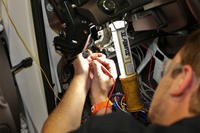When you walk onto a car lot, you're walking into a game where knowing the "rules" can be a big advantage. The dealer is going to be playing chess, so make sure you're not playing checkers.
Starting with the cheery "hello" as you walk through the dealership door, the game is on. The salesperson is playing offense, trying to gather information that ultimately determines how much you pay. Information is power, so you're on defense – the better you protect your information, the more negotiating power you have.
The dealer's game board is what's known in the industry as "four-square" because it focuses on four factors: purchase price, down payment, trade-in value and monthly payment. In four-square, the salesperson tries to figure out the buyer's expectations and financial limits. Knowing this information, the dealer can better control the negotiation by maneuvering between the squares.
For example, if you want a low monthly payment, the dealer may oblige by bumping up the interest rate and the total number of payments, which increases the total amount you pay for the car. Or if you haggle down the purchase price, the dealer may try to recoup that amount by offering less on your trade-in. The way the dealer does the calculations makes it hard to see where the give and take is occurring.
To avoid a checkmate in four-square, share your financial information on a strictly need-to-know basis. Figure out your intended down payment and your monthly payment budget, but keep those details to yourself. If you have a trade-in, don't bring that into the conversation until you reach a final purchase price. We also suggest arriving at the dealership with loan preapproval or your financing already in hand.
By playing it close to the vest on three of the four squares, you can focus your negotiation with the dealer on the purchase price. That may sound simple, but it's not.
Before heading to the dealer, you should know the price range for the type of vehicle you want. Don't look to the dealer to provide that information.
Once you're at the dealer, stay calm and collected at all times. Remember, the game is not personal. The salesperson gets paid by putting you behind the wheel of a new set of wheels, so expect to feel pressure to get the deal done. Don't let yourself get too attached to a vehicle until you've come to terms on price – if you let it show that you're in love, the dealer will know that you're committed and can drive a harder bargain.
Some other things to think about upfront:
- Try to keep your transportation costs under 15% of your monthly take-home pay. Along with the loan payments, this includes fuel, insurance, maintenance and repairs.
- Strive to pay 15% to 20% of the total purchase price as a down payment.
- Avoid financing for terms longer than 60 months. The ideal term is 36 months, but that's not always feasible.
Car buying is emotional and exciting, but never lose sight of the fact that from start to finish the process is engineered to get you to sign on the dotted line. Autos are among the biggest expenses most people have, so you owe it to yourself to push for the best price. The dealer may have the home-field advantage, but with a little advance planning, you may be able to win the game.










